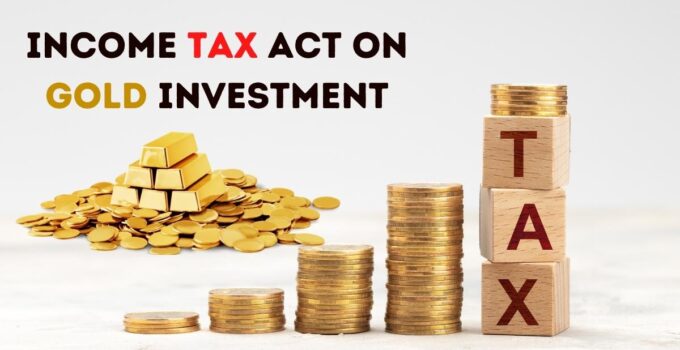The tradition of investing in gold, silver, diamonds, jewelery etc. has existed in India since ancient times. Jewelry was a symbol of family wealth. Today, wearing jewelry at weddings and other functions is considered a sign of prosperity. Investment methods and tools have changed over time. It is also dangerous to carry gold in tangible form. Therefore, there is a growing trend to invest in gold not only in the form of jewelery but also in other types of gold.
In this article, we will look at Gold Investment and Income Tax Act in India & how income tax is levied on capital gains on the sale of different types of gold investments.
Top 4 Different Types of Gold Investment
Investing in gold can be done in the following ways, each of which has risks, advantages, disadvantages. The capital gains tax on its sale differs in some ways:
Physical Gold
Gold is purchased in the form of jewelry or chips. When buying gold, you need to get a bill from the person from whom you bought it. This makes it easier to calculate how much capital gains were made on the sale. In addition, the source of purchase of gold may be sought from the Income Tax Department.
The Central Board of Direct Taxes (CBDT) has said that up to 500 grams of gold from a married woman, 250 grams from an unmarried woman and 100 grams from a man will not be confiscated from the Income Tax Department. If the taxpayer has proof of purchase of gold or inheritance claim and can clarify the source, then there is no limit to the holder of gold. Many have ancestral gold jewelry. The question for the taxpayer is how to pay tax on the sale of such gold.
If gold is sold after 36 months from the date of purchase, then the asset is long term otherwise it is short term. Long-term capital gains are taxed at 20 per cent (plus 4 per cent education tax) and short-term capital gains are taxed at taxpayers’ income. If gold was purchased before April 1, 2001, then the fair market value of April 1, 2001 should be taken into consideration while calculating capital gains.
Sovereign Gold Bond (SGB) Scheme
These bonds are issued by the government. The purchase and sale price is related to the value of gold. These bonds are for eight years. After five years, they are sold on the stock exchange. These can also be bought from the stock market. The bonds earn an annual interest of 2.5 per cent and are not subject to withholding tax; But this interest is taxable.
Bonds are redeemed after maturity according to the current gold prices. Therefore, if the price of gold rises, the investor gets the benefit and if the bond is redeemed after maturity, the capital gain on it is tax free. If the investor sells it after five years, before maturity, then the capital gain on it is taxable and the long term capital gain on it is taxable at 20% (plus 4% education tax).
Digital Gold
Digital Gold is sold through an online e-wallet or app from a licensed digital gold retailer. There is no minimum investment limit. One rupee can also be invested. Digital gold does not have to bear the cost of design when buying tangible gold / jewelry. Digital gold is kept in the e-vault by the buyer. Since it is online, there is no time constraint on buying and selling it. The capital gains on its sale are also taxed like tangible gold.
Gold ETF
In this the investor buys gold in the form of mutual funds without actually buying gold himself. Exchange Traded Funds – Some ETF funds have fixed the unit price at 0.01 gram. Therefore, it can be invested from Rs 50. The price of these ETFV units is determined by the price of gold.
Therefore, if the price of gold increases, the value of the units in this fund, like the Physical gold, increases. Units of this fund can be traded on the stock exchange. The gold investment in this fund is 995 purity. The capital gains on investments in gold Physical are taxed. Similarly, gold has to be paid on the basis of profit earned on the sale of ETF units.
Common Questions about Selling Gold
I inherited some gold from my father. This is the gold I sold last month. Do I have to pay tax on this sale?
If the inherited gold has been purchased by the father before 1st April 2001, then the fair market value of 1st April 2001 should be taken into consideration while calculating the capital gain. This value can also be taken advantage of by the inflation index. If the father bought the gold after April 1, 2001, then the capital gain would have to be calculated according to the inflation rate, taking into account the actual purchase price. If the father had taken the gold in the last three years, the wealth would be short-lived and he would not benefit from the inflation index. If the profit is long term then 20% (plus 4% education tax) and if it is short term then tax as per percentage of income.
Conclusion
When investing in gold, the taxpayer should consider its purpose and seek the help of an investment advisor if needed.
Take a Look




